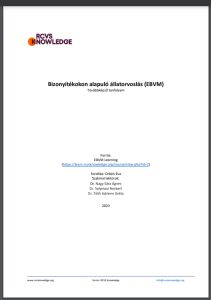
Bizonyítékokon alapuló állatorvoslás (EBVM) : Továbbképző tanfolyam. Publ. RCVS Knowledge, transl. Orbán Éva. Budapest, 2023. URL: http://hdl.handle.net/10832/3680
While both quality assurance (QA) and evidence-based (veterinary) medicine (EBVM) have been part of the practice of doctors and other professionals for centuries, it was only in the 21st century that they booth took off, becoming a mandatory part of running a practice and working in (veterinary) medicine. The two areas are closely interrelated, as we can assess and improve the quality of our service on the bases on facts, data and evidence.
RCVS Knowledge (a charity of the Royal College of Veterinary Surgeons with the mission “to advance the quality of veterinary care for the benefit of animals, the public and society”) supports both the quality assurance of practices and the promotion of evidence-based veterinary medicine through a range of open access teaching materials, toolkits, guidelines, protocols, journals, etc. I have selected the evidence-based veterinary medicine CPD course material, also available in English on their website, which can also be downloaded as a book.
I think that if there is a well-edited, step-by-step introduction to the subject, it is worth using it, rather than inventing a new one. The practical approach of the course material was another reason for choosing it. The large team of authors has well understood the difficulties in following the steps of EBVM and applying the results and has not forgotten to address how to overcome these. They have a clear vision of the veterinary surgeon overburdened by daily work and other commitments and offer solutions that can be applied even under pressure. Another very important lesson is the emphasis on the need for reflection. The loss of time spent on discussion, analysis and reasoning is compensated by the benefits gained by correcting the mistakes, problems identified and by improved performance.
Scepticism may be justified hearing the fashionable terms “quality assurance” or “evidence-based veterinary medicine”, although in Hungary these are far from being overused. Indeed, quality assurance is not worth much if it is only formal, perhaps only a set of standards, and if there is no authentic client-orientation and dedication to improvement behind it. Nor am I impressed by evidence syntheses produced at enormous effort and expense that produce trivial, God forbid, biased results. We do not encounter such in the RCVS Knowledge course (in fact, such evidence syntheses do not exist in veterinary medicine). Realistic expectations are set out about how a practising veterinarian should search for and obtain evidence (with the help of the library!), how it can be used, and how the knowledge gained can be converted into improved veterinary care and therapy.
Thanks to RCVS Knowlege for their permission for the translation and to the Hutyra Ferenc Library, Archives and Museum for making the book freely available in HuVetA. I highly recommend the course Bizonyítékokon alapuló állatorvoslás (EBVM), which can be “done” in a few hours in one sitting or in parts, to all Hungarian veterinary students and veterinarians.
Éva Orbán

